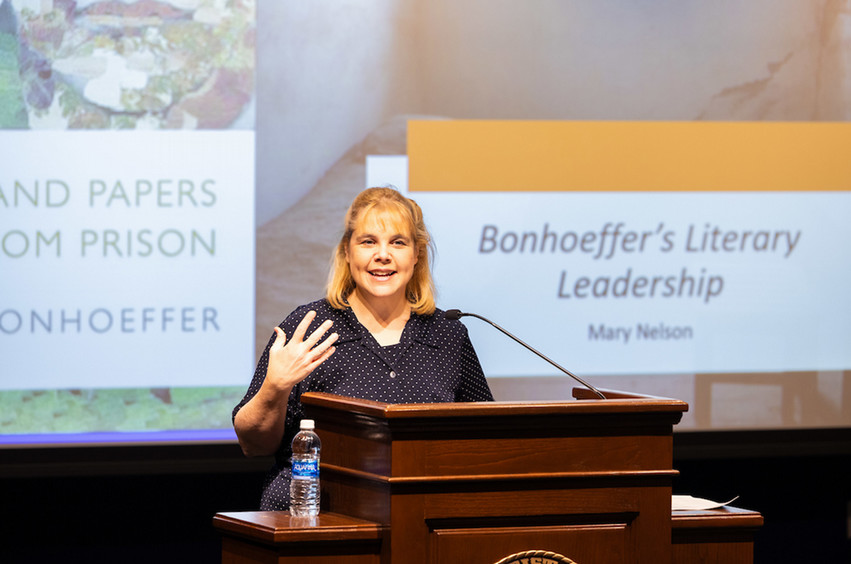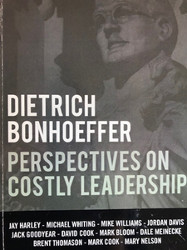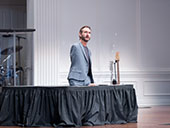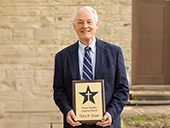Leadership and the Power of Writing: Friday Symposium Featuring Dr. Mary Nelson of the Cook School of Leadership
This article is over six months old and may reference former titles for DBU faculty or staff, discontinued programs, or other details that have since changed. If you have any questions, please contact us at news@dbu.edu, or (214) 333-5172.

Dr. Mary Nelson, Director of DBU's Ph.D. in Leadership Studies, presented at a recent Friday Symposium on the topic of leadership and the power of writing in the life of Dietrich Bonhoeffer. Known for his courageous resistance against Hitler’s Nazi Reich, Dr. Nelson focused on the later years of Bonhoeffer’s incarceration and stressed that the German pastor remained committed even in isolation to leading through the written word in his correspondence and theological reflections. Bonhoeffer’s later writings reveal a man who was committed to not allowing his adversity to hinder him from a fruitful Christian ministry nor to allow Hitler to suppress the values he placed in intellectual engagement, spiritual fellowship, and the bonds of family-centered in the Lordship of Christ.
 Dr. Nelson’s lecture was adapted from her essay in Dietrich Bonhoeffer: Perspectives on Costly Leadership (Random House, 2021), a book co-written with several other members of the DBU faculty.
Dr. Nelson’s lecture was adapted from her essay in Dietrich Bonhoeffer: Perspectives on Costly Leadership (Random House, 2021), a book co-written with several other members of the DBU faculty.
Nelson noted how Bonhoeffer naturally did battle with fear in his incarceration, but he bravely faced his ordeal with faith and a selfless commitment to lifting up others around him. This became an important feature of Bonhoeffer’s later theological emphasis, that God is with and among us, suffering - and through Jesus - calls us to suffer alongside those who suffer.
While in prison Bonhoeffer continued to stimulate his mind in reading and even to experiment more with poetry. As Nelson says, "the time in incarceration seems to have prompted a period of unparalleled productivity for Bonhoeffer." Bonhoeffer was living what he had earlier described as Jesus’ call to costly discipleship, and his life inspires others that ministry does not cease in times of suffering, but these times can be profitable periods of growth and learning, where faith becomes as real as breathing, and contemplation is focused on the great concerns of life before God. Bonhoeffer’s leadership through the power of the written word in the midst of his incarceration is testimony that people through faith can even do "incredible things under really horrific circumstances."
Bonhoeffer also continued to maintain his connection to the Christian fellowship and to build up other believers – "a spiritual fellowship that transcended space, time, and even the walls of Tegel prison." This included correspondence with friends and family outside, thwarting Hitler’s own design to undermine the family unit with ultimate loyalty to the Führer. It was also demonstrated in the continuance of pastoral ministry to the church of his fellow co-sufferers in prison and in the deepening of his empathy for the Jewish people in their oppression under the Nazi regime.
Ironically, Hitler - though the Nazi Party regularly held book burnings - once degraded the role of the written word and praised the power of the spoken word. However, as Dr. Nelson stressed, the continual legacy of Bonhoeffer’s writings is a testimony that beyond his life and martyrdom, the written words of Bonhoeffer still speak, and the written words about his life still powerfully inspire courage to stand for what is right through long, dark nights of injustice.
Dr. Michael Whiting is an Assistant Professor of Christian History and Leadership in the Cook School of Leadership at Dallas Baptist University. He also served as the Director of Written Content in University Communications.








